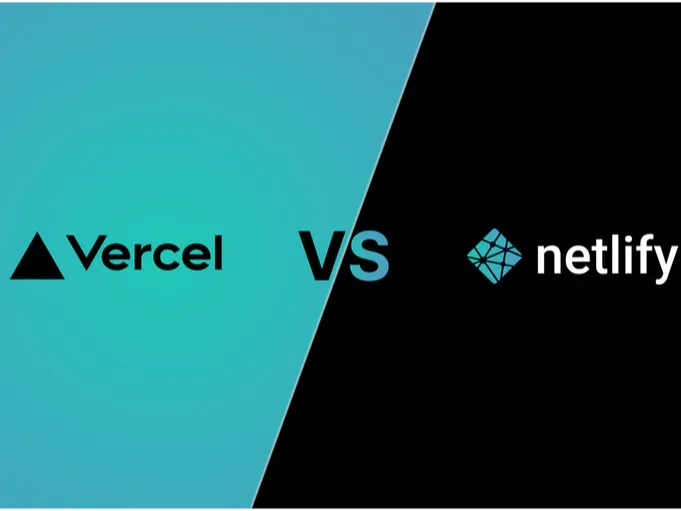Netlify vs. Vercel: Which one is better?
Published on Mar 25 2022
Last updated on May 04 2023

As the demand for web development and deployment increases, there are several platforms that developers can use to host their web applications. Two popular platforms for hosting web applications are Netlify and Vercel. In this blog post, we will compare Netlify and Vercel by discussing what they are, what they do, their similarities and differences, and how to determine which platform to use for your web application. We will also provide examples of applications that best suit each platform.
What are Netlify and Vercel?
Netlify and Vercel are cloud-based platforms that provide developers with tools to host, deploy, and manage their web applications. They both offer a seamless integration with Git repositories, allowing developers to deploy their web applications directly from their code repository.
What does Netlify do?
Netlify is a platform that provides developers with a complete solution for building, deploying, and hosting web applications. Netlify offers several features such as continuous deployment, instant rollbacks, form handling, serverless functions, and more. Netlify is a great platform for static web applications that require fast deployment and hosting.
Netlify is best suited for static web applications such as blogs, portfolios, and landing pages. Examples of applications that can be hosted on Netlify include Gatsby, Hugo, and Jekyll.
What does Vercel do?
Vercel is a platform that provides developers with a cloud-based solution for hosting, deploying, and managing web applications. Vercel offers several features such as continuous deployment, custom domains, serverless functions, and more. Vercel is a great platform for web applications that require fast and scalable deployment.
Vercel is best suited for dynamic web applications such as e-commerce sites, social networks, and web applications that require scalability. Examples of applications that can be hosted on Vercel include Next.js, Nuxt.js, and React.
Similarities between Netlify and Vercel
Git-based workflow: Both platforms have a git-based workflow that allows developers to easily deploy their code to the cloud.
Automatic SSL: Both platforms offer automatic SSL certificates, making it easy to secure your applications.
Global CDN: Both platforms have a global CDN, allowing your applications to load quickly from anywhere in the world.
Continuous deployment: Both platforms support continuous deployment, allowing developers to automatically deploy new changes to their applications as soon as they are pushed to the git repository.
Differences between Netlify and Vercel
Deployment speed: Vercel is known for its fast deployment speed, thanks to its incremental static regeneration feature. Netlify, on the other hand, can be slower for larger applications.
Pricing: Netlify offers a generous free plan with many features included, while Vercel's free plan has more restrictions. Vercel also has a pricing model that is based on usage, while Netlify's pricing is based on the number of team members.
Serverless functions: Vercel's serverless functions are more flexible and can be written in JavaScript, Go, Python, or Ruby. Netlify's serverless functions are limited to JavaScript and Go.
CMS integration: Netlify has built-in integration with CMS platforms like Contentful and Sanity, while Vercel requires third-party integrations.
How to determine which platform to use?
The type of web application you want to host. If you have a static web application, Netlify is a good option. If you have a dynamic web application that requires scalability, Vercel is a better option.
The level of features you need. Both platforms offer different levels of features, so you need to determine the features that are important for your web application.
Your budget. Both platforms offer different pricing plans, so you need to consider your budget when choosing a platform.
Summary
| Netlify | Vercel | |
|---|---|---|
| Deployment speed | Slower for larger applications | Faster, thanks to incremental static regeneration |
| Pricing | Based on number of team members | Based on usage |
| Serverless functions | Limited to JavaScript and Go | More flexible, supports JavaScript, Go, Python, and Ruby |
| CMS integration | Built-in integration with CMS platforms | Requires third-party integrations |
| Git-based workflow | Yes | Yes |
| Automatic SSL | Yes | Yes |
| Global CDN | Yes | Yes |
| Continuous deployment | Yes | Yes |
In conclusion, both Netlify and Vercel are great platforms for hosting web applications, but they have different features and capabilities that make them suitable for different types of web applications. If you have a static web application, Netlify is a good option, while if you have a dynamic web application that requires scalability, Vercel is a better option. You should also consider your budget and the features you need when choosing between these platforms. With the comparison table and information provided in this blog post, you should be able to make an informed decision on which platform to use for your web application.

Written by Alissa Nguyen
FollowAlissa Nguyen is a software engineer with main focus is on building better software with latest technologies and frameworks such as Remix, React, and TailwindCSS. She is currently working on some side projects, exploring her hobbies, and living with her two kitties.
Learn more about me
If you found this article helpful.
You will love these ones as well.